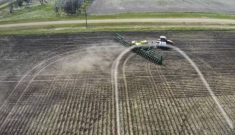ith land values climbing across the country, farming children can no longer expect to inherit all their parents’ farmland. Nonfarming siblings will almost certainly be in line for at least part of the farm. The dollars are just too big to give them all to only one of the children.
The question is: Does that have to be bad news for the farming child?
Alberta tax expert Merle Good says it’s time to accept that rental land is here to stay, and it’s time to plan for it in your will. “I believe that most farmers are going to leave some of their land to non-farming children,” Good says. “Instead of fighting it from the farming business point of view, we need to embrace it and ask what can we do about it.”
Read Also

How scientists are using DNA and climate data to breed crops of the future
A method for forecasting how crops will perform in different environments so that plant breeders can quickly select the best parents for new, climate-resilient varieties.
To bring the concept home, Good, provincial tax specialist in Olds with Alberta Agriculture and Rural Development, cites an example of a parent with land just outside of Calgary, where each quarter might be worth a couple of million dollars.
It’s probably hard to give it all to one farming child, but the farming child will need access to that land to keep the farm viable.
“A couple of years ago, land was selling for $5 million a quarter just outside of Calgary,” Good says. “If you owned five quarters and had three children, what would you do?”
“One child was farming those five quarters, plus more land he was renting, and two other kids weren’t farming. If Dad died tomorrow, how do you split up the land fairly and allow the farming child to keep farming that land, without jeopardizing his farming operation?”
“As a farmer, I need to say, ‘I don’t care if my sister owns a quarter or two, as long as I have access to it.’ If I can have a 10-or 15-year lease, then I know I can continue to farm that land and continue on with my living.”
If this is what the parents want to do, Good says they could set up a conditional bequest in their will that, in this example, would give the daughter title to the land, as long as she agrees to lease it to the son for 10 years.
The provision can even be backed up with a formula which says, for example, that the rental rate would be based on a percentage of the crop insurance guarantee. That way there are no arguments.
“The lease is in place for 10 years, then it’s done. Inside that agreement, we also grant the son, or his farming business, an option to buy the land back if the daughter ever sells it during the term of the lease. The son, for instance, could have the right of first refusal to match any written offer.”
Good says often a non-farming sibling will say, “This is great… I’ve got this stupid land that’s worth $200,000 and I can’t get any money out of it.” But they actually can, he points out. They can go to the bank tomorrow and get cash.
“If you capitalize the rent, it works out to roughly half the fair market value of the land. You can walk into your bank or credit union, say the quarter is worth $200,000 and if the mortgage they give you is $100,000, what’s the risk to them?” he says.
The sister can take the lease and capitalize it into a mortgage immediately. In this example, if she’s netting $9,000 per year after land taxes, the bank would likely give her a loan about $90,000, based on a reverse mortgage at six per cent interest.
“She could right away go get $90,000 to use for funding her children’s education, put into an RRSP or whatever she wants,” Good says. “She also gets the increase in the land value over that time period and at the end of the lease, if she wants to sell it she pays no tax on the growth of the land, because as long as her Dad qualified for the capital gains exemption, she would qualify too.”
Good says if your cash rent gives you a three per cent return, that’s the same as money in the bank and you have the upswing of capital appreciation. To him, that’s a pretty good investment. He says if you look historically on the value of land increasing over the past 25 years, it beats anything else you can invest in.
Farm Credit Canada’s historical land value surveys bear this out. FCC has been tracking land values in every province since 1985.
“We started a system of 245 benchmark farm properties at that time, all on bare land. We do it twice a year — check any sales in that area and compare them to that benchmark property,” says Cathy Gale, manager of land valuations for Saskatchewan, Alberta and B.C.
“Through the ’80s the price of land was up and down, but it’s been rising fairly steadily for the last few years,” Gale says. “With the way the markets have gone, farmland seems to be one of the few stable investments available that farmers can hold on to.”
Good says farmland makes an excellent long-term investment. It allows you to get 2.5 to three per cent of the land value in rent and if you assume even a three per cent annual increase in land value, that’s huge.
“If you take 15 years and an increase of three per cent per year, annually compounded, you gain 55.79 per cent in land value. And that’s all tax-free to you,” he says.
“If the stock market goes up that much — if you put $100,000 in the stock market and it gained to $155,000 — you’d have a capital gain of $55,000, divided by two, times the top tax rate in Alberta is 40 per cent, you’re going to lose $11,000 to income tax, versus owning the land. And your land value could go up faster than that.”
Good says another option is that if the farming sibling has a corporate farm, then Dad could rent the land to the company today, on say a 15-year rolling lease. So if he dies, it doesn’t matter what his will says, it’s a 15-year lease at the time he dies.
The parents would own the land personally but they would lease the land to a holding company with a 10-or 15-year rolling lease. When one parent dies and the land could go to the non-farming sibling, but that person is still bound by the lease.
“That’s one way to do it outside the will,” Good says. “You can also do it inside the will and if you want to have it really sewn up, do it in both. The concept is, the ownership goes to her, but for a certain period of time the business gets access to the land, during which time she can capitalize the rent into a mortgage.”
Own versus rent
For the farming child, Good has a question. Do they want to run a farm, or do they want to be land investors? Everyone would love to own all their land, but they have to ask the question whether owning that piece of land might actually jeopardize the business.
“It’s no different than a guy in Rosetown, Sask., renting a building to run his business. How many small businesses in town would love to own their building, and how many do? Maybe 30 per cent,” Good says. “The majority of small businesses in town pay rent to their landlords. Why should farming be different? That’s the way it’s going to be with land ownership.”
Good adds an interesting twist. If the farming child has the option to buy the land back, there won’t be any real-estate fees, so maybe the land should be priced below fair market value. He says many land owners feel there should be a family discount if the farming child wants to buy it back. Maybe 75 per cent of fair market value would be a fair number.
“The reason to go with the 75 per cent figure is that the farming child would probably be able to get a loan without having to put up other land as security. That’s his down payment, because most lenders expect 25 per cent down, either with cash or additional security. You could put that in the will, as well,” Good says.
In one case in central Alberta where Good worked with a farm family to include a family discount in the will, the son was farming and the daughter was the non-farming child. But they included a clause that said the daughter gets the same deal on any land the son wanted to sell. That way, there’s no favouring the farming child over the non-farming child.
However, if the son stops farming, the long-term lease is terminated and the 25 per cent family discount is void. So he has to be farming for it to be in effect.
Good says it also hinges on the age of the parent and the farming child. If the parents are 55 when they write this will and they feel the farming child needs 15 years to get firmly established, then it makes sense at that point. If the parents are 75 and the farming child is already well established, the lease might only be five years, as the farming business has already had access to the land for the past 20 years. That figure can be updated in the will as the parents age.
“So when you use these conditional bequests,” Good warns, “you need to be careful that you don’t write them up and forget about them.”CG
———
“ Most farmers are going to leave some land to their non-farming children. ”
— Merle Good














